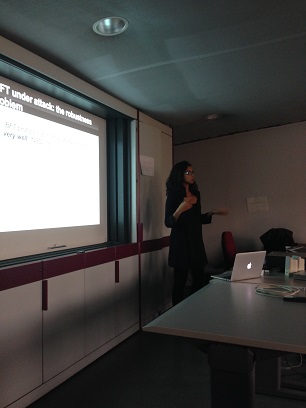Robust Byzantine Fault Tolerant State Machine Replication Protocols (Sonia Benmokhtar)

Abstract
Byzantine Fault Tolerant state machine replication (BFT) protocols are replication protocols that tolerate arbitrary faults of a fraction of the replicas. Although significant efforts have been recently made, existing BFT protocols do not provide acceptable performance when faults occur. As we show in this presentation, this comes from the fact that all existing BFT protocols targeting high throughput use a special replica, called the primary, which indicates to other replicas the order in which requests should be processed. This primary can be "smartly" malicious and degrade the performance of the system without being detected by correct replicas. In this presentation, we present a new approach to solve this issue, called RBFT for Redundant-BFT: we execute multiple instances of the same BFT protocol, each with a primary replica executing on a different machine. The performance of the different instances is closely monitored, in order to check that the master instance provides adequate performance.
A short bio
Sonia Ben Mokhtar is a CNRS researcher at the LIRIS lab, in the DRIM group, since October 2009. Before that, she was a research associate at University College London (UCL) for two years, working with Licia Capra. She received her PhD in 2007 from University Pierre et Marie Curie (Paris 6), which she did under the supervision of Valérie Issarny and Nikolaos Georgantas in the INRIA ARLES project-team.











